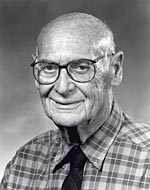In Memoriam
Bert Kaplan
The following obituary was submitted to Currents
by the family of Bert Kaplan.
Bert Kaplan, professor emeritus of psychology at UCSC, died
at his home today (Friday, July 21) of natural causes. He was
87. A member of UCSC's founding faculty, he lived in Santa Cruz
since 1965 and influenced the intellectual development of the
campus in its early years until his retirement in 1989.

Bert Kaplan
|
Born on New York's Lower East Side, Kaplan attended Brooklyn
College, where he majored in psychology. At that time, the Psychology
Department had a remarkable faculty that included Solomon Asch,
Abraham Maslow, and other important figures in social, Gestalt,
and humanistic psychology.
During World War II, Kaplan was stationed in Okinawa and treated
soldiers afflicted with what was then called battle fatigue.
The main method of treatment consisted of encouraging the soldiers
to talk about their experience, and Kaplan remarked later that
although psychologists now know much more about post-traumatic
shock and other afflictions, for some reason the treatment seemed
to work.
After serving in the Army, Kaplan was accepted into the graduate
school at Harvard University's Department of Social Relations.
In this interdisciplinary program that combined anthropology,
sociology, and psychology, he studied with Clyde Kluckholn,
Henry Murray, and Talcott Parsons, and he did research in the
study of personality, which was at the time one of the newest
trends in the field.
Kaplan's own research into the cross-cultural study of personality
raised the question of whether it made sense to think of personality
independently of culture. His doctoral dissertation, "Personality
Studies of Four Cultures," examined personality tests given
to members of four different cultures in the Southwest, including
the Navajo and the Hopi. His work brought him immediate prominence
and success, and he was considered one of the most important
of the postwar generation of social psychologists. He taught
for 10 years at the University of Kansas and two years at Rice
University.
In 1964, Newsweek magazine did an article on his research
on mental illness among the Navajo that became a turning point
in his career. The magazine gave the article the unfortunate
title, "The Sick Indians," and its depictions offended
some of the Navaho he had worked with. The experience left him
disillusioned, and his career began to take a different direction.
Although he had published several successful books, including
Studying Personality Cross-Culturally and The Inner-World
of Mental Illness: First-Person Accounts of What it was Like,
he basically stopped publishing. In the mid-1960s when he was
approached by a major publisher to edit a book on the newly
emerging subject of humanistic psychology, he turned it down.
But he did not stop learning. The new UC campus at Santa Cruz
offered an opportunity to think about education differently,
and along with the other faculty of Cowell College, Kaplan helped
set the tone for an education that emphasized humanistic studies
and an interdisciplinary approach to learning. He offered courses
in psychology and the humanistic disciplines, psychology of
religion, and the interpretation of personal documents. Students
in his courses read Shakespeare, James Joyce, Plato, and St.
Augustine and wrote journals. He once remarked that rather than
trying to apply psychoanalysis to Shakespeare, as was popular
at the time, we should realize that Shakespeare was himself
the greatest psychologist and learn from him.
Kaplan pursued new things enthusiastically and found ways to
incorporate them in his own approach to psychology. When he
was 50, he took up tennis, and then fencing under UCSC's great
fencing coach, Charles Selberg. He offered a course on the psychology
of physical fitness. He explained that he was interested in
psychology's "other principle." The dominant theory
in psychology remains the pleasure principle--people seek pleasure
and avoid pain. Kaplan was interested in why we desire things
that do not in fact bring pleasure. The pursuit of this question
led him to study Plato's discussions of desire and the complex
psychology of physical fitness.
While at UCSC, Kaplan joined faculty members Norman O. Brown,
Page Smith, Albert Hofstadter, Maurice Natanson, and others
in founding a new type of graduate program, the history of consciousness
program. Although the name of the program was considered by
some to represent UCSC's "far-out" approach to education,
the program was intended to bring together the humanities and
social sciences in more sensible ways than did conventional
disciplines. He once remarked that the best thing about UCSC
was that it was not on the make. He was less interested in the
trappings of academic reputation and hierarchy, and helped create
a teaching and learning environment that tried to do things
right. He represented UCSC at its best.
He is survived by his wife, Hermia, and daughter, Emily, both
of Santa Cruz; his son, Josh, in Granger, Indiana; his sister
Sheila Wolfsohn in Florida; and his granddaughter, Hannah, in
Minneapolis. At his request, no services are planned. Contributions
in his memory may be directed to the Hospice Caring Project
of Santa Cruz County, 940 Disc Drive, Scotts Valley, CA; 95066.
 Email this story
Email this story
 Printer-friendly version
Printer-friendly version
 Return to Front Page
Return to Front Page